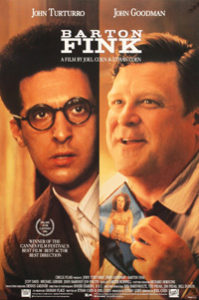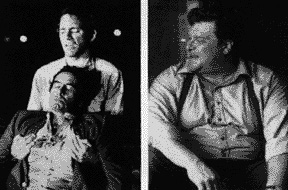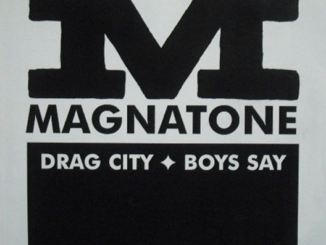 Barton Fink
Barton Fink
with John Turturro, John Goodman, Judy Davis
Written and directed by Joel Cohen and Ethan Cohen (1993)
by Mark Phinney
The mind reeks of crevices, crevices that are open doorways to poisons that corrode the brain and preclude it from operating at an acceptable level. If these functions are out of whack, and aligned with impurities, then the society that is the human being is on a ledge ready to cannonball into the abyss of insanity. This is the driving force behind project Coen’s black- sorry, pitch black- comedy, Barton Fink.
 John Turturro once again turns in a paranoid tour de force as our eponymous hero, a poor, disillusioned playwright creating his art not for commerce, but for the common man (at least he believes so). After being hailed on the New York stage, he is sent to Hollywood where there is no art and where there sure as hell isn’t any common man. After taking up residency at an L.A. dustbucket that doubles as a hotel and his corroding mind, Barton attempts work on a script for a wrestling picture (a genre he knows nothing about), when he is interrupted by a neighbor. Little does Barton know that this neighbor will teach him more about life and the common man’s role in it than he could ever learn elsewhere.
John Turturro once again turns in a paranoid tour de force as our eponymous hero, a poor, disillusioned playwright creating his art not for commerce, but for the common man (at least he believes so). After being hailed on the New York stage, he is sent to Hollywood where there is no art and where there sure as hell isn’t any common man. After taking up residency at an L.A. dustbucket that doubles as a hotel and his corroding mind, Barton attempts work on a script for a wrestling picture (a genre he knows nothing about), when he is interrupted by a neighbor. Little does Barton know that this neighbor will teach him more about life and the common man’s role in it than he could ever learn elsewhere.
 John Goodman displays pathos like we haven’t seen in years as the schlep who goes about life selling insurance with a twinkle in his eye and a drink in his hand. Faster than you can flip a playwright on his back, Barton becomes involved with more than just neighborly camaraderie and Wallace Beery pictures as Hell unfolds before his eyes through not only Goodman, but the philistine quarry that is Hollywood, police interrogation, and the drunken mess of a writer that was once his hero (John Mahoney as the beard of Faulkner). As Fink gets closer and closer to Goodman, so does his descent into the fire. Barton is not only in that forum of paralysis called writers’ block, but in the middle of his own mind watching the events and layers peel off in front of him. I won’t give away the resurrecting ending, but let’s just say that Barton learns the true meaning of the life of the common man, the life of the writer, and the life of the mind.
John Goodman displays pathos like we haven’t seen in years as the schlep who goes about life selling insurance with a twinkle in his eye and a drink in his hand. Faster than you can flip a playwright on his back, Barton becomes involved with more than just neighborly camaraderie and Wallace Beery pictures as Hell unfolds before his eyes through not only Goodman, but the philistine quarry that is Hollywood, police interrogation, and the drunken mess of a writer that was once his hero (John Mahoney as the beard of Faulkner). As Fink gets closer and closer to Goodman, so does his descent into the fire. Barton is not only in that forum of paralysis called writers’ block, but in the middle of his own mind watching the events and layers peel off in front of him. I won’t give away the resurrecting ending, but let’s just say that Barton learns the true meaning of the life of the common man, the life of the writer, and the life of the mind.



